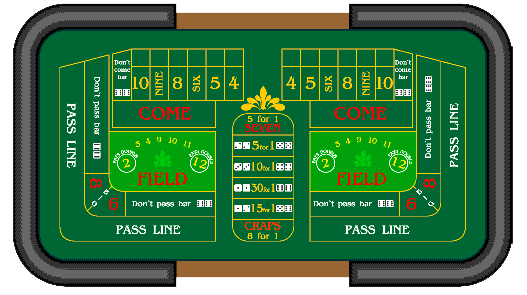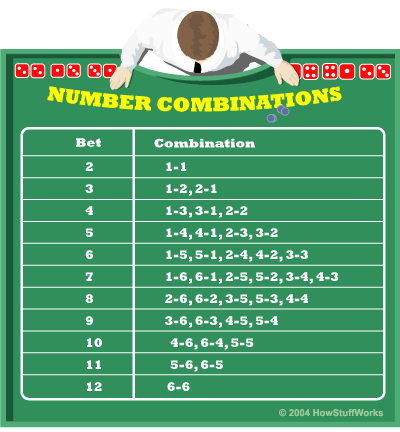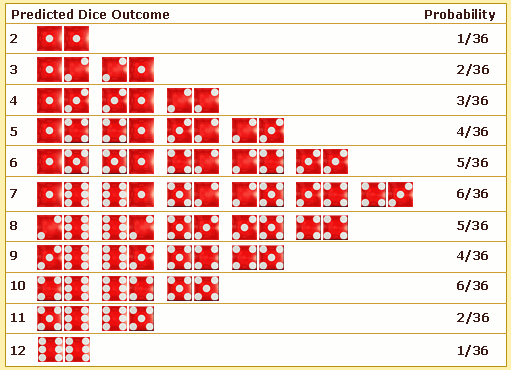Craps Basics
There hasn’t been a movie scene in an American casino where the viewer hasn’t been treated to a game of Craps. There is a very good reason for it – the game is absolutely fantastic. The exhilarating experience stimulates you in ways no other casino game can. Gambling becomes more than throwing a few chips on the table and hoping to get lucky with the dice – it becomes an exciting struggle against the house in which sometimes strong and unlikely bonds are born. Craps is a game like no other and it’s definitely worth the try. Look at the Craps table below.

Sadly, very few casinos outside of the United States offer this enchanting and elegant game. However, if you do find yourself around a Craps table sometime in the future, you will see exactly what we mean. Very few games can bring people so closely together and give you a fair chance to make some money in the same time. There is one thing that you should be warned about though – the game seems infinitely complicated. We say “seems” because Craps is actually a very basic and simple game once you get the hang of it.
All you have to do is get the fundamental principles and learn where the odds are in your favor and where they are not. There are certainly bets that seem alluring at first but when you think about them and gain more experience in playing, you will notice that some of these ostensibly advanced strategies in fact give the house a way bigger edge than you’d initially anticipated. Once you get these awful bets out of the way, you will quickly see through the facade of intricacy and realize the true nature of the game. When this happens, you will start playing a game where the house has almost no edge whatsoever. I’m here to help you with that.
The Simple Game of Craps
We’ve already said that Craps is a simple game and I would like to elaborate on that. The game is played with a pair of two dice. The player throws the dice on a Craps table which has dandy-looking rubber-studded walls. The player who throws the dice is called a Shooter, but he isn’t the only the only who can place a bet (more about that later). When they are thrown on the table, as a rule the dice have to hit the wall. This way it’s ensured that the Shooter can’t get the chance to manipulate the throw in any way, shape or form.
When combined, the two dice can show a total variation of values between the numbers 2 and 12 (meaning that there can’t be a combination lower than 2 or higher than 12). Statistically speaking, some values are more likely to occur than others. For example, there are 6 ways to form a 7 as a total combination between the dice, which means that 7 is mathematically the most likely roll.
This bit is important because the game revolves around it (something that will become clear very soon). Out of 36 combinations, 6 can give you a 7. On the other hand, 2 and 12 are much rare and you get only one combination for each, making it that much more unlikely that you roll them. As you begin to understand the game more, you will see the importance of these numbers and how you can use them as an advantage.

The game has two main stages, and consequently betting opportunities are divided into two main areas. The first stage of the game called a Come-Out Roll. The Shooter rolls the dice in the hopes that he hits either 7 or 11. If luck is on his side and he gets one of these totals, everyone who’s bet with him win their bets and collects their even winnings. However, if he rolls 2,3 or 12 (also known as rolling “Craps”) he and everyone who bet with him lose their bets and the house wins. The really interesting part, though, begins if he gets a total of 4,5,6,8,9 or 10. In this instance, the rolled total claims the title of “the Point” and to signify it, a small white puck is placed on that number to remind everyone what the number was. This is when the game enters the second stage and the true fun begins.
Second Stage
The second stage is called Throwing the Point. The Shooter gets to throw again. This time, though, he tries to throw the number that has become the Point in the previous stage (hence “Throwing the Point”) before he throws a 7. The game goes on until he gets a 7. If he throws the Point before rolling a 7, then everyone who bet with him wins. If the gets a 7 before throwing the Point, then everyone who bet with him lose their bets. There is no limit to the number of throws – the game goes on until he throws a 7.

What we just described were the rules when bettors decide to bet with the Shooter. However, there is another option – betting against the Shooter. In this instance, the rules are basically the same, with a few small differences. If you bet against the Shooter, in the first stage you hope that the Shooter will not throw a 7 or 11, because if he does, you lose when everyone else wins. Instead, you want him to roll 2,3, or 12, in which case you win when everyone else loses. In the second stage, you want the Shooter to throw 7 before the Point.
When you start playing the game, you will notice that most bettors prefer to bet with the Shooter. This way they get to share the intense emotions and excitement when they win, as well as the crushing disappointment when they end up losing. Whatever happens, they know that they are not alone. Nonetheless, betting against the Shooter grants you virtually the same chance of winning as betting with the Shooter, and some people do prefer that option even though they seem happy when other people lose.
As you can see, there is nothing complicated or frightening about the game of Craps. What makes it seem more intimidating is the fact that there is a wide array of betting options. However, most of these options are terrible so you should stick only with those that give you a higher statistical chance to win and keep the house’s edge to the bare minimum.


 PlayOJO Casino
PlayOJO Casino 888casino
888casino All British Casino
All British Casino Casino Action
Casino Action UK Casino Club
UK Casino Club